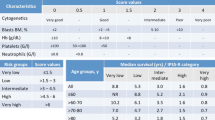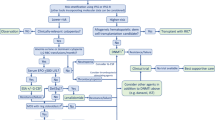Abstract
The majority of patients with myelodysplastic syndromes (MDS) are older, and the incidence of these diseases is rising as the population ages. Clinicians are often uncertain about how to identify patients who may benefit from specific treatment strategies. The International Prognostic Scoring System is a widely used tool to assess risk of transformation to leukemia and guide treatment decisions, but it fails to take into account many aspects of treating elderly patients, including comorbid illness, secondary causes of MDS, prior therapy for MDS, and other age-related health, functional, cognitive, and social problems that affect outcome. Patients with lowrisk disease traditionally have been given supportive care, but evidence is increasing that treatment with lenalidomide or methyltransferase inhibitors may influence the natural history of the disease and should be used in conjunction with supportive-care measures. Supportive care of these patients also could be improved to enhance their quality of life and functional performance.
Similar content being viewed by others
References and Recommended Reading
Rollison DE, Howlader N, Smith MT, et al.: Epidemiology of myelodysplastic syndromes and chronic myeloproliferative disorders in the United States 2001–2004, using data from the NAACCR and SEER programs. Blood 2008, 112:45–52.
Guralnik JM, Eisenstaedt RS, Ferrucci L, et al.: Prevalence of anemia in persons 65 years and older in the United States: evidence for a high rate of unexplained anemia. Blood 2004, 104:2263–2268.
de Witte T, Suciu S, Verhoef G, et al.: Intensive chemotherapy followed by allogeneic or autologous stem cell transplantation for patients with myelodysplastic syndromes (MDSs) and acute myeloid leukemia following MDS. Blood 2001, 98:2326–2331.
Greenberg P, Cox C, LeBeau MM, et al.: International scoring system for evaluating prognosis in myelodysplastic syndromes. Blood 1997, 89:2079–2088.
Cheson BD, Bennett JM, Kantarjian H, et al.: Report of an international working group to standardize response criteria for myelodysplastic syndromes. Blood 2000, 96:3671–3674.
Malcovati L, Germing U, Kuendgen A, et al.: Time-dependent prognostic scoring system for predicting survival and leukemic evolution in myelodysplastic syndromes. J Clin Oncol 2007, 25:3503–3510.
Germing U, Hildebrandt B, Pfeilstöker M, et al.: Refinement of the international prognostic scoring system (IPSS) by including LDH as an additional prognostic variable to improve risk assessment in patients with primary myelodysplastic syndromes (MDS). Leukemia 2005, 19:2223–2231.
Garcia-Manero G, Shan J, Faderl S, et al.: A prognostic score for patients with lower risk myelodysplastic syndrome. Leukemia 2008, 22:538–543.
Kantarjian H, O’Brien S, Ravandi F, et al.: Proposal for a new risk model in myelodysplastic syndrome that accounts for events not considered in the original International Prognostic Scoring System. Cancer 2008, 113:1351–1361.
Chaves PH: Functional outcomes of anemia in older adults. Semin Hematol 2008, 45:255–260.
Fried LP, Tangen CM, Walston J, et al.: Frailty in older adults: evidence for a phenotype. J Gerontol A Biol Sci Med Sci 2001, 56:M146–M156.
Zakai NA, Katz R, Hirsch C, et al.: A prospective study of anemia status, hemoglobin concentration, and mortality in an elderly cohort: the Cardiovascular Health Study. Arch Intern Med 2005, 165:2214–2220.
Chaves PH, Xue QL, Guralnik JM, et al.: What constitutes normal hemoglobin concentration in community-dwelling disabled older women? J Am Geriatr Soc 2004, 52:1811–1816.
Bowen D, Culligan D, Jowitt S, et al.: Guidelines for the diagnosis and therapy of adult myelodysplastic syndromes. Br J Haematol 2003, 120:187–200.
Jansen AJ, Essink-Bot ML, Beckers EA, et al.: Quality of life measurement in patients with transfusion-dependent myelodysplastic syndromes. Br J Haematol 2003, 121:270–274.
List AF, Baer MR, Steensma D, et al.: Deferasirox (ICL670; Exjade) reduces serum ferritin (SF) and labile plasma iron (LPI) in patients with myelodysplastic syndrome [abstract 1470]. Blood (ASH Annual Meeting Abstracts) 2007, 110:440a.
Rose C, Brechignac S, Vassilief D, et al.: Positive impact of iron chelation therapy (CT) on survival in regularly transfused MDS patients; a prospective analysis by the GFM [abstract 249]. Blood (ASH Annual Meeting Abstracts) 2007, 110:80a.
Hellström-Lindberg E: Efficacy of erythropoietin in the myelodysplastic syndromes: a meta-analysis of 205 patients from 17 studies. Br J Haematol 1995, 89:67–71.
A randomized double-blind placebo-controlled study with subcutaneous recombinant human erythropoietin in patients with low-risk myelodysplastic syndromes. Italian Cooperative Study Group for rHuEpo in Myelodysplastic Syndromes. Br J Haematol 1998, 103:1070–1074.
Hellström-Lindberg E, Negrin R, Stein R, et al.: Erythroid response to treatment with G-CSF plus erythropoietin for the anaemia of patients with myelodysplastic syndromes: proposal for a predictive model. Br J Haematol 1997, 99:344–351.
Giraldo P, Nomdedeu B, Loscertales J, et al.: Darbepoetin alpha for the treatment of anemia in patients with myelodysplastic syndromes. Cancer 2006, 107:2807–2816.
Golshayan AR, Jin T, Maciejewski J, et al.: Efficacy of growth factors compared to other therapies for low-risk myelodysplastic syndromes. Br J Haematol 2007, 137:125–132.
Gafter-Gvili A, Fraser A, Paul M, Leibovici L: Meta-analysis: antibiotic prophylaxis reduces mortality in neutropenic patients. Ann Intern Med 2005, 142:979–995.
List A, Dewald G, Bennett J, et al.: Lenalidomide in the myelodysplastic syndrome with chromosome 5q deletion. N Engl J Med 2006, 355:1456–1465.
Raza A, Reeves JA, Feldman EJ, et al.: Phase 2 study of lenalidomide in transfusion-dependent, low-risk, and intermediate-1 risk myelodysplastic syndromes with karyotypes other than deletion 5q. Blood 2008, 111:86–93.
Silverman LR, Demakos EP, Peterson BL, et al.: Randomized controlled trial of azacitidine in patients with the myelodysplastic syndrome: a study of the cancer and leukemia group B. J Clin Oncol 2002, 20:2429–2440.
Fenaux P, Mufti GJ, Santini V, et al.: Azacitidine (AZA) treatment prolongs overall survival (OS) in higher-risk MDS patients compared with conventional care regimens (CCR): results of the AZA-001 phase III study [abstract 817]. Blood (ASH Annual Meeting Abstracts) 2007, 110:250a.
Kantarjian H, Issa JP, Rosenfeld CS, et al.: Decitabine improves patient outcomes in myelodysplastic syndromes: results of a phase III randomized study. Cancer 2006, 106:1794–1803.
De Witte T, Zwaan F, Hermans J, et al.: Allogeneic bone marrow transplantation for secondary leukemia and myelodysplastic syndrome: a survey by the Leukaemia Working Party of the European Bone Marrow Transplantation Group (EBMTG). Br J Haematol 1990, 74:151–155.
Appelbaum FR, Anderson J: Allogeneic bone marrow transplantation for myelodysplastic syndrome: outcomes analysis according to IPSS score. Leukemia 1998, 12(Suppl 1):S25–S29.
Cutler CS, Lee SJ, Greenberg P, et al.: A decision analysis of allogeneic bone marrow transplantation for the myelodysplastic syndromes: delayed transplantation for low-risk myelodysplasia is associated with improved outcome. Blood 2004, 104:579–585.
Sorror ML, Sandmaier BM, Storer BE, et al.: Comorbidity and disease status based risk stratification of outcomes among patients with acute myeloid leukemia or myelodysplasia receiving allogeneic hematopoietic cell transplantation. J Clin Oncol 2007, 25:4246–4254.
Author information
Authors and Affiliations
Corresponding author
Rights and permissions
About this article
Cite this article
Ritchie, E.K., Lachs, M.S. Management of myelodysplastic syndromes in the geriatric patient. Curr Hematol Malig Rep 4, 3–9 (2009). https://doi.org/10.1007/s11899-009-0001-x
Published:
Issue Date:
DOI: https://doi.org/10.1007/s11899-009-0001-x




